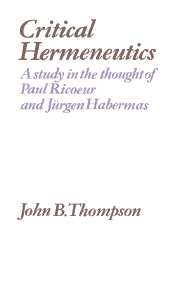Foreword by Anthony Giddens
Published online by Cambridge University Press: 10 December 2009
Summary
In recent years, there have been major changes in social theory in the English-speaking world. What could be called the old ‘orthodox consensus’ in the social sciences was dominated by the pre-eminence of functionalism on the level of methodology, and positivism on the level of epistemology. These ideas never went unquestioned, of course, but in past years they have come under increasing attack – so much so that they certainly no longer reign as an orthodoxy, but have become substantially discredited. One of the results of these events has been a new convergence between the social sciences and philosophy. Indeed, as John Thompson points out, some of those authors who have written under the influence of recent trends in ordinary language philosophy have advanced the view that social science can be regarded as ‘a conceptual extension of philosophy’. This is not a position which Thompson accepts, but he does acknowledge the significance of the contributions that such authors have made to pressing issues in social theory at the current juncture.
In the first part of his book, Thompson analyses these contributions in a concise and elegant way. He concentrates his attention upon three main areas of analysis: problems of action, interpretation and truth. In each of these areas, ordinary language philosophy is shown to have encountered a cluster of unresolved difficulties.
- Type
- Chapter
- Information
- Critical HermeneuticsA Study in the Thought of Paul Ricoeur and Jürgen Habermas, pp. vii - viiiPublisher: Cambridge University PressPrint publication year: 1981



